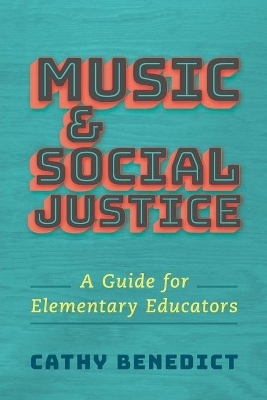
Music and Social Justice
A Guide for Elementary Educators
Seiten
2021
Oxford University Press Inc (Verlag)
978-0-19-006213-2 (ISBN)
Oxford University Press Inc (Verlag)
978-0-19-006213-2 (ISBN)
In this book author Cathy Benedict offers practical suggestions to help elementary and middle school teachers and students think critically about the world around them, by engaging with themes such as friendship, racism, poverty, religion, and class.
In this book author Cathy Benedict challenges and reframes traditional ways of addressing many of the topics we have come to think of as social justice. Offering practical suggestions for helping both teachers and students think philosophically (and thus critically) about the world around them, each chapter engages with important themes through music making and learning as it presents scenarios, examples of dialogue with students, unit ideas and lesson plans geared toward elementary students (ages 6-14). Taken-for-granted subjects often considered beyond the understanding of elementary students such as friendship, racism, poverty, religion, and class are addressed and interrogated in such a way that honours the voice and critical thinking of the elementary student. Suggestions are given that help both teachers and students to pause, reflect and redirect dialogue with questions that uncover bias, misinformation and misunderstandings that too often stand in the way of coming to know and embracing difference. Guiding questions, which anchor many curricular mandates, are used throughout in order to scaffold critical and reflective thinking beginning in the earliest grades of elementary music education. Where does social justice reside? Whose voice is being heard and whose is being silenced? How do we come to think of and construct poverty? How is it that musics become used the way they are used? What happens to songs initially intended for socially driven purposes when their significance is undermined? These questions and more are explored encouraging music teachers to embrace a path toward socially just engagements at the elementary and middle school levels.
In this book author Cathy Benedict challenges and reframes traditional ways of addressing many of the topics we have come to think of as social justice. Offering practical suggestions for helping both teachers and students think philosophically (and thus critically) about the world around them, each chapter engages with important themes through music making and learning as it presents scenarios, examples of dialogue with students, unit ideas and lesson plans geared toward elementary students (ages 6-14). Taken-for-granted subjects often considered beyond the understanding of elementary students such as friendship, racism, poverty, religion, and class are addressed and interrogated in such a way that honours the voice and critical thinking of the elementary student. Suggestions are given that help both teachers and students to pause, reflect and redirect dialogue with questions that uncover bias, misinformation and misunderstandings that too often stand in the way of coming to know and embracing difference. Guiding questions, which anchor many curricular mandates, are used throughout in order to scaffold critical and reflective thinking beginning in the earliest grades of elementary music education. Where does social justice reside? Whose voice is being heard and whose is being silenced? How do we come to think of and construct poverty? How is it that musics become used the way they are used? What happens to songs initially intended for socially driven purposes when their significance is undermined? These questions and more are explored encouraging music teachers to embrace a path toward socially just engagements at the elementary and middle school levels.
Cathy Benedict is Associate Professor of Music Education at Western University and co-editor of The Oxford Handbook of Social Justice and Music Education (2015)
Introduction
Chapter 1 - Listening and Responding: Dialogue in Practice
Chapter 2 - Communicating Justice and Equity: Meeting the Other
Chapter 3 - Friendship and Bullying: Interrogating Forced Narratives
Chapter 4 - Soundscapes: Listening for Meaningful Relationships - In Conversation with Kelly Bylica
Chapter 5 - Educating for Intelligent Belief or Unbelief
Chapter 6 - Politics of Song
Chapter 7 - Policy and Teaching: Establishing Change - In Conversation with Patrick Schmidt
Afterword
Index
| Erscheinungsdatum | 15.01.2021 |
|---|---|
| Verlagsort | New York |
| Sprache | englisch |
| Maße | 155 x 231 mm |
| Gewicht | 236 g |
| Themenwelt | Kunst / Musik / Theater ► Musik ► Musiktheorie / Musiklehre |
| Geisteswissenschaften ► Philosophie ► Ethik | |
| ISBN-10 | 0-19-006213-4 / 0190062134 |
| ISBN-13 | 978-0-19-006213-2 / 9780190062132 |
| Zustand | Neuware |
| Haben Sie eine Frage zum Produkt? |
Mehr entdecken
aus dem Bereich
aus dem Bereich
Grundbegriffe, Harmonik, Formen, Instrumente
Buch | Softcover (2021)
Philipp Reclam (Verlag)
CHF 12,90
Jazz als Gegenkultur im westlichen Nachkriegsdeutschland
Buch | Hardcover (2024)
edition text + kritik (Verlag)
CHF 57,90


